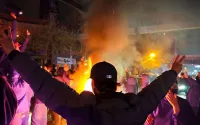Tony Blair last night suffered a fresh blow after Kofi Annan, the UN Secretary General, said the war in Iraq was "illegal".
Speaking on the BBC World Service, Mr Annan said the war was "not in conformity" with the UN Security Council or with the UN Charter.
Asked if there was legal authority for the war on Iraq, Mr Annan said: "I have stated clearly that it was not in conformity with the security council, with the UN charter."
He also said there could not be credible elections in Iraq next January if the current unrest continued.
His remarks are certain to provoke demands by anti-war Labour MPs at Westminster today for a statement by the Attorney General, Lord Goldsmith. The UN weapons inspection team, led by Hans Blix, found little evidence of weapons of mass destruction, but this is the first time that Mr Annan has been so outspoken in his criticism of the grounds for going to war.
The Foreign Office last night sought to play down Mr Annan's comments, saying: "The Attorney General made the Government's position on the legal basis about the use of military force clear at the time."
However, both Robin Cook, the former Foreign Secretary, and Clare Short, the ex-Secretary of State for International Development, resigned from the Cabinet over the war, challenged the legality of the war and Lord Goldsmith's ruling.
There has been continuing doubt about the legality of the war. Ms Short has claimed that the chiefs of staff of the armed forces were reluctant to go to war until Lord Goldsmith gave a ruling on the eve of battle that there was legal justification for the war.
Lord Goldsmith argued that the threat from weapons of mass destruction was one of the reasons for justifying action under UN resolution 1441. However, the Iraq Survey Group is expected to confirm that no evidence of WMD has been found.
Elizabeth Wilmshurst, the number two in the Foreign Office legal team, resigned in protest at the case for attacking Iraq in a pre-emptive strike, a week before the war began. It has also been claimed that the Foreign Office fears that its legal justification for the war on Iraq could be open to legal challenge as a result of the ruling in the International Court of Justice against the construction of Israel's security wall.
Mr Annan's question over the Iraq elections could prove more damaging for the US and the UK alliance
The Foreign Secretary Jack Straw told a private meeting of Labour MPs this week that the purpose of the attacks by insurgents in Iraq was to prevent elections taking place. He said the stakes were high because a peaceful democratic Iraq would be a model for the Middle East.
Mr Annan said last month that UN staff returning to Iraq after two suicide bomb attacks last October would have to rely on US-led multinational forces for their protection. The small team led by Ashraf Jehangir Qazi of Pakistan is due to arrive in Baghdad on 22 September with the UN election team.
Mr Straw told the MPs attempts were made to get non-multinational force countries to provide security for the team but, apart from Canada, that was unsuccessful. Mr Straw said the failure to close the borders to insurgents after the war was the major failing of the post war period.
Meanwhile, the US sought yesterday to defend the two helicopter pilots who fired seven rockets into a crowd in Baghdad on Sunday, killing 13 people and wounding 41, saying they had come under "well-aimed ground fire". This is different from the first statement by the US military claiming that they opened fire with rockets to prevent a Bradley fighting vehicle which had been hit by a bomb from being looted of arms and ammunition.
The US account of the incident in which Mazen al-Tomeizi, a Palestinian television producer working for al-Arabiya satellite channel was killed, was contradicted by the film taken by his cameraman at the moment the rocket struck. There is no sound of firing from the crowd in the moments before the helicopters attacked.
The US military's accounts of incidents in which it claims to have targeted insurgents but only civilians have died are frequently discredited by Arab television pictures of the incident, which US officers apparently do not watch before issuing statements. At the weekend the US claimed to have hit insurgents in a precision raid in Fallujah while Iraqis were watching pictures on television of an ambulance attacked from the air in which a driver, a paramedic and five patients died.
The war in Iraq continues to intensify, with a sharp increase in the overall death rate. Three headless bodies were discovered yesterday on a road north of Baghdad and appeared from tattoos to be Iraqis whose hands were tied behind their backs.
While insurgents have often beheaded foreign hostages in their fight against the government and coalition forces, it is not a tactic usually used against Iraqis.
In Ramadi, west of Baghdad, there was an upsurge of fighting in which 10 people were killed, including two women.
Meanwhile, the US has dashed Iraqi hopes that money would at last be invested in the country's crumbling infrastructure and no longer spent on arms and security services as under Saddam Hussein. The State Department has announced that it is switching $3.4bn of US funds from water and power projects. Most of the money will be reallocated to boosting security and oil output.
Iraqis had expected that 18 months after the invasion they would get continuous electricity supplies. Instead, many districts in Baghdad get only 14 hours a day. Polluted water is one of the chief killers of children but even in an important city such as Basra only 18 per cent of the supply is clean.
Marc Grossman, the US under-secretary of state for political affairs, said earlier in the week that $1.8bn of the diverted money would go to recruit 35,000 Iraqi police officers, 16,000 border guards and 20 Iraqi national guard brigades.
http://news.independent.co.uk/low_res/story.jsp?story=562237&host=3&dir=508






